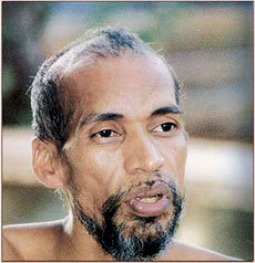You can also listen to audio clip of Munishri's pravachan on Sanyam on youtube-
"http://www.youtube.com/watch?
UTTAMA SANYAM (SUPREME RESTRAINT)
· To control, regularize and manage one’s mind-speech and senses is known as Sanyam.
· Sanyam doesn’t mean mere discipline; it is Aatmanushasan – discipline of one’s spiritual self.
Yesterday we made our minds to inculcate truth in our lives. To make sure we keep up our resolutions and don't get deviated we have today - the day of making our life more disciplined and committed. Whatever have we learnt so far, today we commit to ourselves to maintain that intact. If we have attained the flame of truth in our life then it becomes our duty to put a chimney of Sanyam or commitment on it so that the torch of truth remains intact.
Sanyam is not a Bondage/ Barrier
At first Sanyam may look like bondage, a barrier. Why should we restrict ourselves with what to do what not to do? Why should we be restricted by some commitment? Can’t we live without these commitments/ promises? If we want to make our lives better then it’s necessary to put some kind of restrictions or check points that make sure we only rise up in our lives. All other mundane bondages and worldly relations are only a cause of one’s downfall, whereas Sanyam in spite of being bondage helps you to rise in your life. It is just like the rope with which we tie a wine to some tree trunk or a stick so that with its help, the wine keeps growing upward.
Role of Discipline in Growth
We impose discipline in our life for several reasons – fear, material gains, or sometimes for our body – to protect our health. But all these disciplines don’t help us in improving our lives. Sanyam, therefore, does not mean mere discipline; it means Aatmanushasan – discipline of one’s spiritual self(by oneself).
Sanyam means – living a disciplined life, increasing one’s commitment and will power. It needs a lot of courage to take a pledge for a lifetime, to bind oneself under a limit, to commit oneself especially when it is not being imposed by someone else but a discipline being accepted by oneself. If we are able to gather this kind of courage then our 'self confidence' keep on growing by the day.
Sanyam (Restraint) the process of Refinement
What does Sanyam do to our life – it helps us refine and correct the deeply ingrained habits and tendencies which otherwise we find very difficult to get rid of. It is Sanyam which refines and corrects the tendencies that we have acquired due to our indiscipline, carelessness, disoriented lives. To refine such practices is the job of Sanyam or Spiritual Restraint.
Sanyam is a way to healthy and balanced life – what to eat, how to eat, when to eat, what to think, what is to be done and what not to be done…. If our life lacks health and balance then would we call it a healthy life? None of us wants to live an unhealthy or unbalanced life. Before doing anything, just think over it with respect to – when? How? Why? & What? What to do – what not to do? How to do – how not to do? Why to do – why not to do? Do not do whatever your mind & senses (mann aur indriyan) signals you . Just this little bit of thought will help us lead a healthy and balanced life. If our body feels sick then we get worried over it. We should be more worried if our Chetna is geting spoiled, if it is getting off balance.
To put our mind & senses to proper use, to give them a correct direction is called restraint of senses (Indriya Niyantran). Our senses are like a horse – a horse ride is considered pleasurable, & the horse is also supposed to be a fast & healthy one; not that you are riding a weak horse. If we kill all desires of our mind, paralyze our senses or harm them then it’s not going to help us. Instead direct/ guide your mind, & keep the rope control of your senses in your hand & then see how easy your life will become. All we have to do is imbibe only two things – practice and austerity.
Purity of Vision – Wholesomeness of Knowledge (Drushti Ki Nirmalta – Samyaktva Ka Pradurbhav, or Holistic knowledge)
The knowledge that shows the path of austerity is the best knowledge. A pure vision maintains a symbiosis of knowledge and austerity. Therefore our great Acharyas have said – “One who is rich with knowledge and austerity shall automatically achieve a balanced life.”
If we decide once to control, direct and discipline our mind, our senses, our speech and our life then our life shall surely be balanced, controlled, healthy, and restrained. Let’s all pray to raise our lives, to achieve Sanyam (Supreme discipline & restraint) in our lives.
Guruvar Kshamasagarji Maharaj Ki Jai!
Our warm thanks to Yogendra for compiling this article
